american exceptionalism
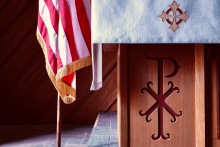
In Keeping Faith, philosopher Cornel West explains that our investment of “existential capital” in the nation-state leaves us with “a profound, even gut-level, commitment to some of the illusions of the present epoch.” We experience amnesia when we allow our nation’s myths to be the foundation of our current reality.
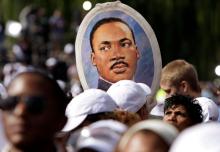
In order to understand King's life and legacy, it is critical that his activism be understood in the context of his call as a minister. In 1956 a sermon titled, “Paul's Letter to American Christians,” King called for a “better distribution of wealth.” He also asserted that “God never intended one people to live in superfluous inordinate wealth, while others live in abject deadening poverty.” Holistically interpreting King’s theological work as a pastor, public theologian, and faith leader requires grounding his anti-capitalism in his self-identification as a “minister of the Christian gospel.”

As Christians, we are citizens of the kingdom of God. But a common roadblock to dedicating our lives to the kingdom of God by loving our neighbors to the best of our ability is the temptation to allow our allegiance to the country in which we live supersede our allegiance to the kingdom of God — to succumb to nationalism.

Edward Said’s profoundly influential 1978 book, Orientalism, describes the term as the West’s portrayal of the East as decadent, static, exotic, and uncivilized. Most importantly, Said’s work emphasizes how these constructions of this exotic ‘other’ are rooted in the West’s need to define itself as different from and superior to the Orient. While his analysis focused on European and American essentializations about Islamic civilization, another implication of orientalism is what these same Western observers thought about their co-religionists in the birthplace of Christianity.

The need for lament could not be more urgent. The painful reality of the loss of more than 100,000 American lives requires the response of lament. However, a genuine corporate lament seems to have eluded many Americans, even those in the church. Lament is a biblical practice that has been long-neglected in the American church.

We pass our indifference down generation to generation. To fix that, it is not that we create a generation of religious zealots, but we raise up young people who are aware of the world around them, who are not blanketed by their privilege, who learn to take hold of what God has given them instead of complaining about it. We raise our children to ask questions, to live in love, to value human life and our created world in every country, in every situation.

In many conversations I’ve had with my friends who are people of color, it’s clear the church has set itself up in America to mostly benefit a certain kind of person. The white American church is a Western version of the gospel that often manifests as a top-down model that benefits the wealthy. And the more that I learn about my own Native American identity tied to the church, the more I see that truth throughout our nation’s history.

While I was in Germany last week, watching the American election from afar, the Lutheran lectionary called for Micah 6:6-8 as text. That last verse plays a central role in America’s self-perception. It leads back to the year 1630, when a group of pious Calvinists sailed from England to North America. Boxed in between state church and English monarchy, they longed for more space to follow their religion. They wanted to build a society centered on the word of the God of the Bible. The Pilgrims decided to leave Europe and its institutions to become American immigrants. No walls could have stopped them.

San Francisco quarterback Colin Kaepernick refused to stand while the National Anthem played on Friday night. He plans to continue his protest into the season. He defended his decision over the weekend, stating that, “This country stands for freedom, liberty, justice for all – and it’s not happening right now.”
By sitting down, Kaepernick is standing up for those people who remain voiceless. “There’s people being murdered unjustly and not being held accountable. Cops are getting paid leave for killing people. That’s not right.”

Dear Missionaries,
I like to tell people I’m a missionary convert, because I wear this genesis of my faith journey proudly, like a badge of honor. I heard the story of Jesus from your lips, sang the songs of worship in your language, and prayed for the concerns in your heart. You taught me how to be Christian.
I learned from your lavish generosity and boundless love and affection. I also learned how to do Christmas. One day in my freshman year of high school, I asked my Chinese parents if we could find a Christmas tree. This was before Christmas became commercialized in Taiwan, so all I could find was a tacky, tiny, plastic tree, which I set up delightfully in the corner of our living room. I arranged neatly wrapped fake presents under my wannabe tree and meticulously set up some lights. I longed for that warm feeling I felt in your homes, the atmosphere I saw in American movies. I wanted to be like you; if only I could have convinced my parents to do Christmas like you did, with gifts, candles, and prayers.
Little did I know your celebrations were crippled by your overseas living because, like me, you also could only find dinky little plastic trees. When I visited your home country, I saw the full potential of CHRISTMAS unleashed, with real trees as tall as houses and white lights, icicle lights, flashing lights, lights shaped like reindeer, elaborate nativity sets, and ridiculous amounts of presents and candy. I thought, wow, is this how the Christians do Christmas?

When we consider the typical church worship service in the United States, we discover certain trends. Lament and stories of suffering are conspicuously absent. In Hurting with God, Glenn Pemberton notes that laments constitute 40 percent of the Psalms, but in the hymnal for the Churches of Christ, laments make up 13 percent, the Presbyterian hymnal 19 percent, and the Baptist hymnal 13 percent.
Christian Copyright Licensing International (CCLI) licenses local churches for the use of contemporary worship songs. CCLI tracks the songs that are employed by local churches, and its list of the top 100 worship songs as of August 2012 reveals that only five of the songs would qualify as a lament. Most of the songs reflect themes of celebratory praise: “Here I Am to Worship,” “Happy Day,” “Indescribable,” “Friend of God,” “Glorious Day,” “Marvelous Light,” and “Victory in Jesus.”
How we worship reveals what we prioritize. The American church avoids lament. Consequently the underlying narrative of suffering that requires lament is lost in lieu of a triumphalistic, victorious narrative. We forget the necessity of lament over suffering and pain. Absence doesn’t make the heart grow fonder. Absence makes the heart forget. The absence of lament in the liturgy of the American church results in the loss of memory.
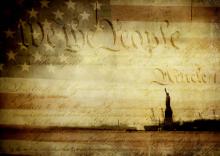
What do I love about America? I love the land, one of the most spectacularly beautiful countries in the world (and I’ve visited many of them). I love walking our long stretches of beaches, hiking our majestic mountains, seeing the desert skies, walking beside the rivers, sailing along the coasts, and visiting hundreds of lakes in my home state of Michigan, where I camped as a kid. I even love some of our big cities! “O beautiful for spacious skies, for amber waves of grain, for purple mountain majesties, above the fruited plains.” I love our many diverse cultures, including their music, their food, their art, their sports, and their particular stories and histories.
I especially love our best national values: freedom, opportunity, community, justice, human rights, and equality under the law for all of our citizens of every race, creed, culture, and gender, not just for the rich and powerful. In particular, I love our tradition and history of democracy, its steady expansion here, and how it has inspired the same all over the world. We take legitimate pride in seeing how our founding documents have been the models for many new nations.
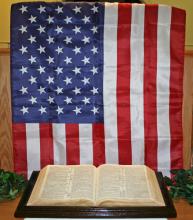
1) You Love To Argue, Fight, And Attack
There’s nothing quite like flooding people’s Facebook feeds with posts about the sins of gay marriage, abortion, and the Democratic Party or the volleyed claims of bigotry, hypocrisy, and self-interest.
American Christians seemingly love to argue with people and engage themselves in various culture wars. Whether it’s about the existence of global warming, prayer in schools, evolution, gun control, or homosexuality, you love to let people know that you’re RIGHT and they’re WRONG. Oh yeah, and if you don’t agree with me —You’re going to hell! Literally.
Your main forms of communication include boycotting, accusing, yelling, screaming, pointing, spewing, slandering, shaming, shaking your fists, and waving protest signs. In fact, you’ll probably write a venomous response to this piece in the comments section below.

Recently, someone asked me to respond (on video) to how I reconciled both love of God and love for country. I struggled with the question, mostly because of the typical baggage that comes along with Christian patriotism, much of which teeters on the verge of jingoism. So I didn’t respond at all.
I’m really sensitive to what I call “Christian exceptionalism.” There are those within Christianity that honestly believe America is God’s second Zion, the new Israel, and that we Americans are God’s new chosen people. This, in turn, helps justify everything from flags in worship spaces to the Ten Commandments in the public square, and even pre-emptive acts of aggression against perceived threats around the world.
Basically, when you hold yourself up as somehow favored in the eyes of God, it’s easy to hold those you deem as less favored to be somehow “less than,” and to dehumanize all who do not conform to your custom-built ideal of what it means to be “American.”
For me, though, such sentiments not only are un-American in the sense that they don’t ascribe to the “liberty and justice for all” ethos; it’s also patently un-Christian.
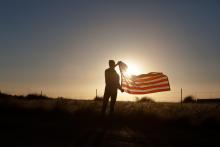
What does it mean to be exceptional?
Most people have to worry about making enemies. You know, they’re constantly freaked out that they might offend somebody or hurt somebody’s precious feelings. But I don’t worry about that. I’m exceptional. Other people in my family worry about everyone getting their fair share at the dinner table. They might really like mashed potatoes or lasagna, but they only take a normal small portion so that their sister or grandmother or cousin can have some too. But I don’t worry about those sorts of things. After all, I’m exceptional. I take as much as I want.
When you’re an exceptional nation, you want other nations to worry about your opinion of them. You don’t really care what their opinion is of you. When you’re a run-of-the-mill country, you’ll be nervous about going against the United Nations or the Geneva Conventions or the International Criminal Court and such, but when you’re an exceptional country, that sort of concern is beneath your dignity. You set expectations; you don’t fulfill them. Of course, with exceptional status comes exceptional responsibility, so we have the sole responsibility to drop nuclear bombs on nations that cause problems for the world—unexceptional nations, that is, which means everybody else but us. It’s a tough job, being exceptional, but somebody has to do it.
Between now and the elections in November, my guess is we’re going to hear the term “American exceptionalism” echoing from the mountains to the prairies to the oceans white with foam; echoing ad nauseum. It’s become a powerful political meme in recent years, popular but poorly defined. The history of the term aids and abets in its vagueness.
Thomas Jefferson repeatedly spoke of the United States as a unique—or exceptional—historical phenomenon. As a democratic republic, it differed from Europe, and all the nations of the past. Since then, of course, scores of nations have followed our example in forming democratic republics, so what was exceptional in Jefferson’s time has now, we might say, become the norm.
Does that make us “the nation formerly known as exceptional,” but now typical?
The Tea Party Express -- the traveling band of conservative speakers, entertainers, and organizers -- stops in Washington, D.C., today on its nationwide effort to "vote them out of office" in the 2010 mid-term elections. Sarah Palin, one of the most galvanizing conservatives in years, has joined the Express in an attempt to bring more mainstream conservatives into its ranks.